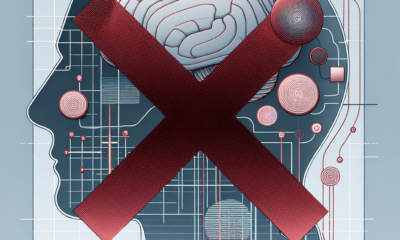Podcasts
Three AI experts on how access to ChatGPT-style tech is about to change our world – podcast
Three AI experts on how access to ChatGPT-style tech is about to change our world – podcast

ktsimage via Canva
Daniel Merino, The Conversation and Nehal El-Hadi, The Conversation
ChatGPT burst onto the technology world, gaining 100 million users by the end of January 2023, just two months after its launch and bringing with it a looming sense of change.
The technology itself is fascinating, but part of what makes ChatGPT uniquely interesting is the fact that essentially overnight, most of the world gained access to a powerful generative artificial intelligence that they could use for their own purposes. In this episode of The Conversation Weekly, we speak with researchers who study computer science, technology and economics to explore how the rapid adoption of technologies has, for the most part, failed to change social and economic systems in the past – but why AI might be different, despite its weaknesses.
Spending just a few minutes playing with new, generative AI algorithms can show you just how powerful they are. You can open up Dall-E, type in a phrase like “dinosaur riding motorcycle across a bridge,” and seconds later, the algorithm will produce multiple images more or less depicting what you asked for. ChatGPT does much the same, just with text as its output.

The Conversation/OpenAI, CC BY-ND
These models are trained on huge amounts of data taken from the internet, and as Daniel Acuña, an associate professor of computer science at the University of Colorado, Boulder, in the U.S. explains, that can be a problem. “If we are feeding these models data from the past and data from today, they will learn some biases,” Acuña says. “They will relate words – let’s say about occupations – and find relationships between words and how they are used with certain genders or certain races.”
The problem of bias in AI is not new, but with increased access, more people are now using it, and as Acuña says, “I hope that whoever is using those models is aware of these issues.”
With any new technology there is always a risk of misuse, but these concerns are usually accompanied by hope that as people gain access to better tools, their lives will improve. That theory is exactly what Kentaro Toyama, a professor of community information at the University of Michigan, has studied for nearly two decades.
“What I ultimately discovered was that it is quite possible to get research results that were positive, where some kind of technology would enhance a situation in a government or school, or in a clinic,” explains Toyama. “But it was nearly impossible to take that technological idea and then have it have impact at wider scales.”
Ultimately, Toyama came to believe that “technology amplifies underlying human forces. And in our current world, those human forces are aligned in a way that the rich get richer and inequality keeps growing.” But he was open to the idea that if AI could be inserted into a system that was trying to improve equality, then it would be an excellent tool for that.
Technologies can change social and economic systems when access increases, according to Thierry Rayna, an economist who studies innovation and entrepreneurship. He has studied how widespread access to digital music, 3D printing, block chain and other technologies fundamentally change the relationship between producers and consumers. In each of these cases, “increasingly people have become prosumers, meaning they are actively involved in the production process.” Rayna predicts the same will be true with generative AI.
Rayna says that “In a situation where everybody’s producing stuff and people are consuming from other people, the main issue is that choice becomes absolutely overwhelming.” Once an economic system reaches this point, according to Rayna, platforms and influences become the wielders of power. But Rayna thinks that once people can not only use AI algorithms, but train their own, “It will probably be the first time in a long time that the platforms will actually be in danger.”
This episode was written and produced by Katie Flood and hosted by Dan Merino. The interim executive producer is Mend Mariwany. Eloise Stevens does our sound design, and our theme music is by Neeta Sarl.
You can find us on Twitter @TC_Audio, on Instagram at theconversationdotcom or via email. You can also subscribe The Conversation’s free daily email here. A transcript of this episode will be available soon.
Listen to “The Conversation Weekly” via any of the apps listed above, download it directly via our RSS feed or find out how else to listen here.![]()
Daniel Merino, Associate Science Editor & Co-Host of The Conversation Weekly Podcast, The Conversation and Nehal El-Hadi, Science + Technology Editor & Co-Host of The Conversation Weekly Podcast, The Conversation
This article is republished from The Conversation under a Creative Commons license. Read the original article.
Mississippi Today
Podcast: Bill to ensure rape kits are available pending in final days of legislative session
Rep. Dana McLean, R-Columbus, joins Mississippi Today’s Bobby Harrison and Sophia Paffenroth to explain the importance of passing her legislation during the 2025 session to ensure local emergency rooms use rape kits in a timely manner.
READ MORE: As lawmakers look to cut taxes, Mississippi mayors and county leaders outline infrastructure needs
This article first appeared on Mississippi Today and is republished here under a Creative Commons license.![]()
Crooked Letter Sports Podcast
Podcast: At the intersection of basketball and baseball…
We cover a busy Mississippi scene in both hoops and hardball with a little Jaxson Dart to the Saints projection thrown in for good measure.
Stream all episodes here.
This article first appeared on Mississippi Today and is republished here under a Creative Commons license.![]()
Mississippi Today
Podcast: Is the Mississippi Legislature any closer to a tax cut/elimination/increase deal?
Senate Finance Chairman Josh Harkins gives an update on where negotiations stand on tax overhaul proposals in the Mississippi Legislature, and his thoughts on the differing Senate and House proposals that would include cutting or eliminating the personal income tax and raising taxes on gasoline.
READ MORE: As lawmakers look to cut taxes, Mississippi mayors and county leaders outline infrastructure needs
This article first appeared on Mississippi Today and is republished here under a Creative Commons license.![]()
-

 News from the South - Florida News Feed5 days ago
News from the South - Florida News Feed5 days agoFamily mourns death of 10-year-old Xavier Williams
-

 News from the South - Alabama News Feed6 days ago
News from the South - Alabama News Feed6 days ago1 Dead, Officer and Bystander Hurt in Shootout | March 25, 2025 | News 19 at 9 p.m.
-

 News from the South - Arkansas News Feed7 days ago
News from the South - Arkansas News Feed7 days agoReport: Proposed Medicaid, SNAP cuts would cost Arkansas thousands of jobs, $1B in GDP
-

 News from the South - North Carolina News Feed7 days ago
News from the South - North Carolina News Feed7 days agoClassmates remember college student hit by car, killed near NC State
-

 News from the South - Alabama News Feed4 days ago
News from the South - Alabama News Feed4 days agoSevere storms will impact Alabama this weekend. Damaging winds, hail, and a tornado threat are al…
-

 News from the South - Alabama News Feed3 days ago
News from the South - Alabama News Feed3 days agoUniversity of Alabama student detained by ICE moved to Louisiana
-

 News from the South - Oklahoma News Feed7 days ago
News from the South - Oklahoma News Feed7 days agoRep. Tom Cole Says DOGE Is ‘Pretty Responsive’ to His Concerns
-

 News from the South - Louisiana News Feed5 days ago
News from the South - Louisiana News Feed5 days agoSeafood testers find Shreveport restaurants deceiving customers with foreign shrimp
















































